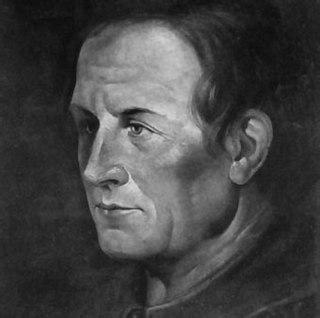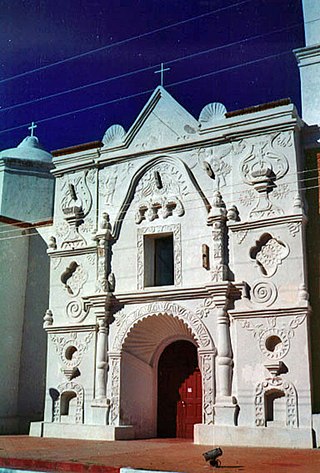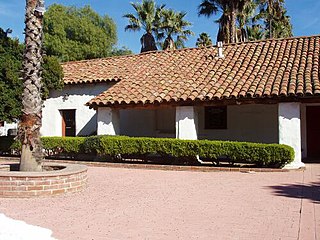
Francisco Hermenegildo Tomás GarcésO.F.M. was a Spanish Franciscan friar who served as a missionary and explorer in the colonial Viceroyalty of New Spain. He explored much of the southwestern region of North America, including present day Sonora and Baja California in Mexico, and the U.S. states of Arizona and California. He was killed along with his companion friars during an uprising by the Native American population, and they have been declared martyrs for the faith by the Catholic Church. The cause for his canonization was opened by the Church.

Eusebio Francisco Kino, SJ, often referred to as Father Kino, was an Italian Jesuit, missionary, geographer, explorer, cartographer, mathematician and astronomer born in the Bishopric of Trent, Holy Roman Empire.

The Spanish missions in Mexico are a series of religious outposts established by Spanish Catholic Franciscans, Jesuits, Augustinians, and Dominicans to spread the Christian doctrine among the local natives. Since 1493, the Kingdom of Spain had maintained a number of missions throughout Nueva España in order to preach the gospel to these lands. In 1533, at the request of Hernán Cortés, Carlos V sent the first Franciscan friars with orders to establish a series of installations throughout the country.

The Spanish missions in the Sonoran Desert are a series of Jesuit Catholic religious outposts established by the Spanish Catholic Jesuits and other orders for religious conversions of the Pima and Tohono O'odham indigenous peoples residing in the Sonoran Desert. An added goal was giving Spain a colonial presence in their frontier territory of the Sonora y Sinaloa Province in the Viceroyalty of New Spain, and relocating by Indian Reductions settlements and encomiendas for agricultural, ranching, and mining labor.

The Archdiocese of Hermosillo is a Roman Catholic Archdiocese located in Hermosillo, Sonora, Mexico. Its area is 90,959 sq. miles, and its population (2004) 1,067,051. The bishop resides at Hermosillo.

Magdalena de Kino is a city, part of the surrounding municipality of the same name, located in the Mexican state of Sonora covering approximately 560 square miles. According to the 2005 census, the city's population was 23,101, and the municipality's population was 25,500. Magdalena de Kino is in the northern section of Sonora 50 miles from the Mexico-U.S. border. To the north the municipality abuts Nogales; to the south, the municipality of Santa Ana; to the east, Ímuris and Cucurpe; and to the west, the municipalities of Tubutama and Sáric. Its main sectors include San Ignacio, San Isidro, Tacicuri, and Sásabe. The city was named after the pioneer Roman Catholic missionary and explorer, Father Eusebio Francisco Kino, who worked in the area, as well as in the present-day US state of Arizona.
The Free Company of Volunteers of Catalonia was a military company of the Spanish Army serving in the Spanish colonial empire.
Ures is a small city and a municipality in the Mexican state of Sonora.

Mission San Pedro y San Pablo del Tubutama is a Spanish mission located in Tubutama, Sonora, first founded in 1691 by Eusebio Francisco Kino.

Altar is a municipality in the Mexican state of Sonora in north-western Mexico. The municipality had a 2010 census population of 9,049 inhabitants, the vast majority of whom lived in the municipal seat of Altar, which had a population of 7,927 inhabitants. There are no other localities with over 1,000 inhabitants.
San Pedro y San Pablo is Spanish for Saint Paul and Saint Peter. It may refer to:

Asistencias or visitas were smaller sub-missions of Catholic missions established during the 16th-19th centuries of the Spanish colonization of the Americas and the Philippines. They allowed the Catholic church and the Spanish crown to extend their reach into native populations at a modest cost.
Pedro Font (1737–1781) was a Catalan Franciscan missionary and diarist.
Juan Bautista Grazhoffer (1690–1733) was a Jesuit missionary to the Sonoran Desert. He served briefly at Mission Los Santos Ángeles de Guevavi before his death, possibly by poison.
Francisco Antonio Barbastro (1735–1800) was a Franciscan missionary in New Spain.
Jacobo Sedelmayr (1702–1779) was a Jesuit missionary in New Spain, known for his explorations of the Pimería Alta.
Daniel Januske was a Jesuit missionary in New Spain.
Francisco Xavier Villarroya (1734–1768) was a Jesuit missionary to New Spain.

The first federal electoral district of Sonora(Distrito electoral federal 01 de Sonora) is one of the 300 electoral districts into which Mexico is divided for elections to the federal Chamber of Deputies and one of seven such districts in the state of Sonora.












